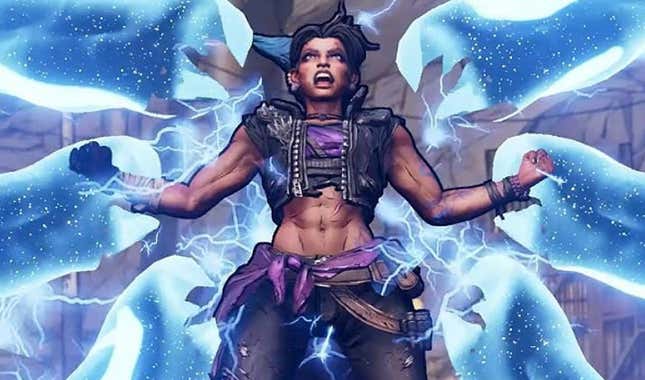
For more than a decade, Steam has dominated the PC gaming market. More than 100 million people have amassed vast game collections on Valve’s platform, not to mention friends and communities. Now Epic is trying to muscle in on Steam’s turf, and a certain segment of PC game players are remarkably mad about that. Here are the reasons why.
“Unfair” exclusive games
The creator of Fortnite and Unreal Engine launched its PC game store back in December. Epic said it would take just a 12 percent cut of developers’ sales on its platform, versus Steam’s 30. It also promised a more curated storefront than Steam’s virtual free-for-all, and said that customer reviews for games would be strictly optional for developers, moves that seemed like they could potentially stem the tide of toxicity that’s plagued Steam for years.
Epic had a few lower-profile exclusive games during this initial launch, such as Ashen and Hades. But when it began to accumulate a series of increasingly high-profile exclusive games from triple-A studios, like Walking Dead: The Final Season, The Division 2, and (for some reason) the collected works of David Cage, that’s when players began to get angry.
The tipping point was Metro: Exodus. Epic announced its exclusivity on January 28, just two weeks prior to the game’s launch. It was so close to launching that it already had its own Steam page, and many customers had already pre-ordered it on Valve’s service.
Valve itself then entered the conversation—rather than removing the game’s Steam page, it left it online and posted a note that read, in part, that “the decision to remove the game is unfair to Steam customers.” This gave Steam fans their rallying cry: Competition might be good, but Epic’s type of competition was not fair.
Review bombs of earlier games in the series on Steam followed, as did irate mobs on Twitter, Reddit, and other websites. In Metro’s case, some went after people who weren’t even involved in the decision, like Metro book series author Dmitry Glukhovsky. This has now become standard practice when a high-profile game becomes an Epic exclusive, as most recently seen with Borderlands 3, which also resulted in review bombs and widespread rage.
Why, though, are people this upset? After all, it’s not like big companies haven’t tried to compete with Steam before. Most famously, Electronic Arts migrated its biggest series over to its own homegrown platform Origin back in 2011, causing Steam to miss out on more recent iterations of Battlefield, Titanfall, and Dragon Age, among others.. Origin is far from beloved, but it’s never prompted this kind of outcry, either. Plus, it’s not like these temporary Epic Games Store exclusives are skipping PC. People just have to download another, free launcher to play them.
Perhaps the difference is that Epic isn’t just taking its ball and going home—it’s snatching up a whole Dick’s Sporting Goods’ worth of balls, helmets, and cleats. It’s not just keeping its own games, like Fortnite, off Valve’s platform, but enticing away games from Steam. That seems to be the definition, here, of “unfair” competition.
Leaving Steam features behind
Epic is snaring lots of exclusives at a time when Steam is even more entrenched than it was back when the likes of EA’s Origin and Ubisoft’s Uplay launched. Players like Steam’s robust suite of extra features. Popping open Epic’s launcher means temporarily exiting the Steam ecosystem, leaving behind friends lists (if you choose not to import them), groups, and quality-of-life features with it.

It doesn’t help that booting up Epic’s store is like walking into a post-apocalyptic supermarket. It’s as barren as they come in terms of features, with next to nothing in the way of community tools, cloud saves, achievements, wishlists, mod support, user reviews, forums, or other longtime Steam standards. Many of these things are planned, but they’re still a ways off.
Even minor Steam features can mean more to some people than you’d initially expect. As ex-Valve developer Chet Faliszek said over the weekend on Twitter, Valve’s trading card system is more important to some players than you might think. You can earn them by playing games, sell them on the Steam marketplace, and earn cash. “Between them and selling items when I was playing PUBG, I earned enough to buy multiple games,” Faliszek said. “That’s crazy powerful, especially in depressed regions.”
Speaking of regions, some games wind up region-locked on the Epic Store, meaning they’re either more expensive outside the United States or not buyable at all.
Concerns about “spyware” and/or conspiracy theories
Earlier this year, Redditors claimed to have discovered evidence that the Epic Games Store included spyware intended to track users. This, Epic went on to explain, is just software that keeps tabs on page statistics to help more accurately pay people as part of Epic’s “Support-A-Creator” program. Epic said the rest is just basic hardware survey info, which is outlined in the company’s privacy policy. Steam has a similar optional feature.
People also accused the Epic Store of mining and sharing Steam data without permission, but Epic said it only sends that data back to itself if users opt into importing their Steam friends lists to the Epic launcher. Epic CEO Tim Sweeney did, however, acknowledge that there was something wrong with the feature as it launched, saying that the launcher should only access those Steam files “after the user chooses to import Steam friends. The version that raised eyebrows, he said, was a “remnant left over from our rush to implement social features in the early days of Fortnite.”
Epic’s Store has also been dogged by security concerns, albeit largely ones stemming from Fortnite’s spotty history in that area. Similarly, Fortnite’s reputation for bad customer service has carried over to the store its countless cartoon millions helped construct, as well as a refund system that’s received mixed reviews. Epic believes that reputation is overblown.
Steam has also had its fair share of large-scale security fiascoes and customer service gaffes over the years. It’s also constantly collecting data about users. But for these same users, these things clearly have not been deal-breakers.

Then there are the Chinese conspiracy theories. Yes, it’s time to go down a rabbit hole. The conspiracy theories stem from the aforementioned spyware accusations and the fact that Chinese company Tencent, one of the biggest video game companies in the world, owns 40 percent of Epic. The Epic Store’s most vocal opponents have decided that Epic and Tencent are selling users’ data to the Chinese government. These fears are, to be clear, outlandish, but not entirely outside the realm of possibility, given that the Chinese government likes to buddy up with big companies, and some, like telecommunications giant Huawei, have been accused of colluding with the Chinese government in pursuit of espionage. However, Tencent also owns portions of Ubisoft, Activision Blizzard, Riot, Discord, and Paradox, among others, and there’s been no funny business to speak of. In addition, Epic says that Tencent is one of many investors, not a shadowy dictator.
Last week, Epic’s CEO Tim Sweeney directly addressed the conspiracy theories in a Twitter thread. “I support everyone’s right to complain about tech industry stuff,” he said. “Epic’s store, with exclusive games and a spartan feature set, is a fine target for ire. But please help separate facts and opinions from the lies about spyware and foreign control. I’m the controlling shareholder in Epic Games, and have been since 1991. We have a number of outside investors now. Tencent is the largest. All of Epic’s investors our [sic] friends and partners. None can dictate decisions to Epic. None have access to Epic customer data.”
A vision of a fragmented PC future breaking up Steam’s convenient monopoly
On its own, Epic’s store is an inconvenience, a few extra clicks before you can play a cool new game. That’s literally it right now. It doesn’t force you to spend additional money just to install it, nor does it, say, delete Steam from your PC. But if everybody starts fleeing from Steam, PC gaming could become a jumbled mess of disparate game stores, collections, and communities, each with their own rules and quality standards.

Steam, for all its flaws, has unified and standardized PC gaming. However, it’s never been a complete monopoly. Blizzard games like World of Warcraft and, more recently, Overwatch have always had their own ecosystem. So has League of Legends. For years, though, games like that felt like outliers. In recent years, we’ve seen more continental drift, with Activision adding Call of Duty and Destiny to Blizzard’s launcher while Bethesda chose (at least, temporarily) to go its own way with Fallout 76.
Meanwhile, other major players like Discord have launched stores with their own, lower-profile exclusive programs. With these things in mind, you can see why some Steam users might have a dystopian vision of the future. Some imagine a world in which the Epic Games Store kills Steam and replaces it as the biggest PC gaming mega-mart in town, forcing people to re-buy games they’d previously owned on Steam. There’s no evidence this will actually happen, given that Steam is still doing just fine and Valve has more money than several real-world nations, but that hasn’t stopped people from extrapolating what’s happening right now into a potent worst-case scenario.
They’ve been dealing with Valve’s version of “fairness” for years
It makes sense that Steam users would view things like this through a lens of perceived “fairness” even if Valve hadn’t used the word itself. After all, their default for more than a decade has been Valve’s ecosystem and the messaging about openness and fairness that accompanies it. Valve has spent years implementing laissez-faire, free-market policies for everything from game releases to user reviews to community groups and then reacting to controversies stemming from those policies by opening things up even more.
In its messaging over the years, Valve has continually stressed a dedication to keeping Steam open and fair, at least by its own definitions of the terms. It has designed a series of systems and charts that, on their face, seem impersonal and unbiased. The core underlying structure of Steam is an algorithm that’s meant to serve up game recommendations to users on a meritocratic basis. Based on what players previously have seemed to like and other factors like prior popularity, review scores, and wishlists, games get more visibility or they don’t. Steam is, seemingly, guided purely by the market. All games are locked in gladiatorial combat for attention. Each one has an equal chance. The best games rise, while merely decent and, of course, bad games fall.
It is through this lens that Steam users define what constitutes “fair” and “unfair” competition. They can define what unfair competition looks like in a heartbeat. It’s any overt attempts to undermine this entrenched, often-taken-for-granted system. Within Steam, that might mean “fake” games intended to help people farm trading cards or achievements—games that aren’t traditionally “good,” but also aren’t really hurting anybody, by Valve’s measure. Despite this, these games have drawn a disproportionate amount of ire over the years, and Valve has historically done a poor job of shutting that ire down.
The same goes for developers who game the review system, or delete comments on forums. In the grand scheme of things, few developers actually do this, but Steam users view any instance of it as symptomatic of a larger rot. Epic, too, is gaming Steam’s ostensibly fair system. It’s throwing money around to lock down highly anticipated games for arbitrary periods of time on PC, where all borders are ultimately arbitrary and the default is Steam. Epic isn’t testing its mettle against competitors on an even playing field, the line of thinking goes; it’s giving itself an artificial advantage with heaping gobs of cash.
But that notion of fairness is ultimately illusory, born of the way Valve has run its business since Steam began making enough money for it to transform into an IRL version of the company from Portal. The algorithm is continually designed and updated by human beings, and has biases. Sometimes Valve performs experiments on it with unintended consequences that benefit big games over small ones. Other times, it works exactly as intended, but tends to prioritize games that are already popular.
The free market is rarely, if ever, actually free, and competition, especially inside a well-oiled money-making machine like Steam, isn’t fair. People game the system precisely because Steam is unfair. Success often comes down to who can ride luck, the wax and wane of genre preferences, timing, gimmicks, algorithmic shifts, and even underhanded tactics like lying about release dates to the top of a select handful of charts that go a disproportionately long way toward determining success or failure.
This inherent unfairness is present, too, in the competition between Steam and Epic, and it creates a similar sort of tension that Steam users can only vent through rage. In theory, “fair” competition would involve another service coming along with a better feature set than Steam and winning the day on merit alone. Easy enough. But, nestled within that sleek shell of simplicity is a briar ball of thorny particularities. What features could possibly lure Steam users away from their gargantuan game libraries on a store where everybody releases by default? In what sense is it “fair” that Valve has those things going for them? How can anyone hope to level that playing field and create a competitive environment that’s truly fair?
This is not to say that Valve has cheated in some deliberately nefarious way by succeeding. Rather, the point is that, as Twitch streamer and personality Casey Explosion explained on Twitter, there’s no such thing as fair competition at the scale Valve and Epic are operating on. The great equalizer (or un-equalizer, as it were) is, as ever, money. That’s infuriating to realize. It is the colossal bummer at the heart of capitalism. This has been like razor blades for Steam users to swallow because it seems to have been effective. Last month, Epic said that Metro Exodus sold two and a half times as many copies at launch as its predecessor, Metro: Last Light, did on Steam. It’s not just that Epic is using tactics that are perceived as “unfair.” It’s that those tactics are working.
The hate for the Epic Store stems from a variety of concerns. Some of them, like the store’s threadbare feature set and region-locking, are legitimate, even if they don’t merit this degree of response. Other concerns, however, are conspiracy or conjecture, and all of the anger has been amplified by the megaphone of Steam’s own longtime rhetoric and structural issues. We’ve got a messy, drawn-out fight on our hands, and since Epic doesn’t seem like it’s finished snagging major exclusives for its store, things are probably just going to get messier before the dust settles.